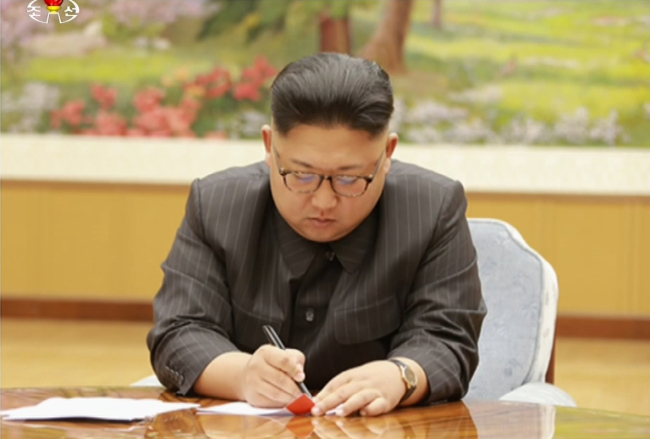[Stock Preview] North Korea risks loom over Kospi
By Son Ji-hyoungPublished : Sept. 3, 2017 - 16:18
Security tension is most likely to return to focus in South Korea’s stock markets this week following the North’s sixth nuclear test Sunday, further dampening investors’ sentiment.
A 5.7 magnitude tremor was detected in northeastern North Korea on Sunday at around 12:29 p.m., which North Korea claimed to be a test of a hydrogen bomb that can be loaded into its intercontinental ballistic missile.
A 5.7 magnitude tremor was detected in northeastern North Korea on Sunday at around 12:29 p.m., which North Korea claimed to be a test of a hydrogen bomb that can be loaded into its intercontinental ballistic missile.

“The news would bring noise in investor sentiments and stock markets in South Korea and the United States,” Kim Hyoung-ryoul, a strategist at Kyobo Securities, told The Korea Herald.
But he added the noise could die down soon, unless the risk saps the real domestic economy.
On the date of North Korea’s fifth nuclear test on Sept. 9, 2016, the primary bourse index Kospi slid 1.25 percent, while on the next trading day on Sept. 12 it fell 2.28 percent. The market index, however, rose for the next six consecutive trading days, paring the two-day losses.
Others, however, have said that the external and geopolitical risk will have a more lasting impact on the markets, particularly after North Korea’s ICBM development that has made investors more sensitive.
The Kospi would stray “into a minefield” in the coming of September, wrote Kim Yong-gu, an analyst at Hana Financial Investment in a Friday note.
“Investors’ caution toward external risks would reach its height in September,” Kim said.
Aside from North Korea threats, he pointed to other external woes such as the European Central Bank’s likely move toward tapering and the US Federal Open Market Committee‘s possible reduction in the balance sheet.
Kim Yong-ho of Taurus Investment & Securities, also wrote in a Friday note that markets have been “seeing a delay” in shaking off latest geopolitical tensions sparked by saber-rattling between North Korea and the US in early August.
These come in tune with the Bank of Korea Gov. Lee Ju-yeol’s decision to hold the central bank’s key rate at a record-low of 1.25 percent for 14 months, due to financial markets that fluctuated “to considerable extents in line with increases in geopolitical risks.”
Since August, South Korea’s markets have been susceptible to geopolitical risks. Rising tension in early August had put an end to the monthslong record rally since May that pushed the index above 2,400. The index has hovered at below-2,400 territory since Aug. 2.
Before the Sunday provocations, North Korea fired on Tuesday what was confirmed to be a Hwasong-12, an intermediate-range ballistic missile, over northern Japanese airspace, triggering offshore investors’ net sales of stocks worth 500.9 billion won ($447 million) during four trading days since the date of missile launch.
The index had seen a slight recovery during the South Korea-US joint military exercise Ulchi Freedom Guardian and closed at 2,378.51 on Aug. 25, after the Kospi plunged 5.4 percent to 2,319.71 on Aug. 11 from the record-high at 2,451.53 on July 24.
The Kospi closed at 2,357.69 on Friday, down 0.23 percent from Thursday and 0.88 percent from Aug. 25.
By Son Ji-hyoung
(consnow@heraldcorp.com)
But he added the noise could die down soon, unless the risk saps the real domestic economy.
On the date of North Korea’s fifth nuclear test on Sept. 9, 2016, the primary bourse index Kospi slid 1.25 percent, while on the next trading day on Sept. 12 it fell 2.28 percent. The market index, however, rose for the next six consecutive trading days, paring the two-day losses.
Others, however, have said that the external and geopolitical risk will have a more lasting impact on the markets, particularly after North Korea’s ICBM development that has made investors more sensitive.
The Kospi would stray “into a minefield” in the coming of September, wrote Kim Yong-gu, an analyst at Hana Financial Investment in a Friday note.
“Investors’ caution toward external risks would reach its height in September,” Kim said.
Aside from North Korea threats, he pointed to other external woes such as the European Central Bank’s likely move toward tapering and the US Federal Open Market Committee‘s possible reduction in the balance sheet.
Kim Yong-ho of Taurus Investment & Securities, also wrote in a Friday note that markets have been “seeing a delay” in shaking off latest geopolitical tensions sparked by saber-rattling between North Korea and the US in early August.
These come in tune with the Bank of Korea Gov. Lee Ju-yeol’s decision to hold the central bank’s key rate at a record-low of 1.25 percent for 14 months, due to financial markets that fluctuated “to considerable extents in line with increases in geopolitical risks.”
Since August, South Korea’s markets have been susceptible to geopolitical risks. Rising tension in early August had put an end to the monthslong record rally since May that pushed the index above 2,400. The index has hovered at below-2,400 territory since Aug. 2.
Before the Sunday provocations, North Korea fired on Tuesday what was confirmed to be a Hwasong-12, an intermediate-range ballistic missile, over northern Japanese airspace, triggering offshore investors’ net sales of stocks worth 500.9 billion won ($447 million) during four trading days since the date of missile launch.
The index had seen a slight recovery during the South Korea-US joint military exercise Ulchi Freedom Guardian and closed at 2,378.51 on Aug. 25, after the Kospi plunged 5.4 percent to 2,319.71 on Aug. 11 from the record-high at 2,451.53 on July 24.
The Kospi closed at 2,357.69 on Friday, down 0.23 percent from Thursday and 0.88 percent from Aug. 25.
By Son Ji-hyoung
(consnow@heraldcorp.com)








![[Kim Seong-kon] Democracy and the future of South Korea](http://res.heraldm.com/phpwas/restmb_idxmake.php?idx=644&simg=/content/image/2024/04/16/20240416050802_0.jpg&u=)








![[KH Explains] Hyundai's full hybrid edge to pay off amid slow transition to pure EVs](http://res.heraldm.com/phpwas/restmb_idxmake.php?idx=652&simg=/content/image/2024/04/18/20240418050645_0.jpg&u=20240418181020)

![[Today’s K-pop] Zico drops snippet of collaboration with Jennie](http://res.heraldm.com/phpwas/restmb_idxmake.php?idx=642&simg=/content/image/2024/04/18/20240418050702_0.jpg&u=)